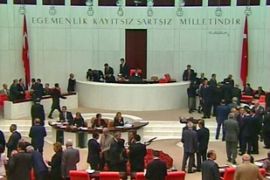Turkey to change controversial law
Move seen as an attempt to address EU concern about Turkey’s free speech record.

Orhan Pamuk, the Nobel Prize-winning author, was prosecuted under the law after he commented on the mass killings of Armenians by Turks in the early 20th century.
“The amendment has been completed and will be brought to parliament soon,” private NTV and CNN-Turk televisions quoted Ali Sahin Mehmet, Turkey’s justice minister, as saying on Tuesday.
Stumbling block
Al jazeera’s Mike Hanna said in Istanbul that this particular law had been singled out as one of the issues that have precluded the resumption of talks about Turkey’s EU membership.
“There is no doubt that the major reason for the Turkish position at present is because of international pressure and specifically because the EU made it clear that it absolutely precludes any movement towards the membership if the law stays in place.”
The measure is likely to pass parliament, where Prime Minister Recep Tayyip Erdogan’s party has a majority.
The announcement came just hours after the EU reiterated its concerns about the law in its annual report.
|
“It is not acceptable that writers, journalists, academics and other intellectuals … are prosecuted for simply expressing a critical but completely nonviolent opinion” Olli Rehn, EU’s Enlargement Commissioner |
The European Union has said it did not fit within the bloc’s standards of free speech, and has been one of the stumbling blocks to Turkish accession since talks began in 2005.
“It is not acceptable that writers, journalists, academics and other intellectuals … are prosecuted for simply expressing a critical but completely nonviolent opinion,” Olli Rehn, EU’s Enlargement Commissioner, said when presenting the report on Turkey.
“The infamous Article 301 must be repealed or amended without delay,” Rehn said.
In addition to Pamuk, numerous other writers, journalists and academics have also been prosecuted under the law.
Death toll ‘inflated’
Hrant Dink, the ethnic Armenian journalist who was the editor of the minority Agos newspaper, was shot outside his Istanbul office on January 19, following his prosecution for comments he made about the killings of Armenians.
Turkey contends that the Armenian death toll has been inflated and the deaths were the result of civil unrest, not genocide.
Dink’s murder revived a debate about the law, and many said his prosecution made him a target for radical nationalists.
Tens of thousands turned out for his funeral, but many other Turks viewed him as an irritant whose commentaries were objectionable.
Turkish leaders have said the law is damaging Turkey‘s image by portraying it as a country where intellectuals are jailed for speaking their opinions.
Given the sensitivity of the debate over the law, it is unlikely it will be dropped entirely, but the decision to amend it indicates it will be softened to restrict its interpretation by prosecutors.